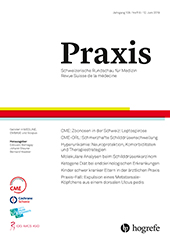Abstract
Zusammenfassung. Eine ernsthafte körperliche Erkrankung eines Elternteils betrifft die ganze Familie. Kinder kranker Eltern erfahren im medizinischen System jedoch kaum Beachtung. Oft spüren sie die Not der Eltern, zeigen sich im Sinne einer Parentifizierung überangepasst und bleiben als Folge in ihren Sorgen und Ängsten gefangen. Für die effektive Unterstützung der betroffenen Kinder sind Kenntnisse über ihren Entwicklungsstand und über die Art der innerfamiliären Kommunikation notwendig. Interventionen haben das Ziel, die Eltern in ihrer Funktion zu stützen, die Kommunikation zu fördern, den Austausch von Gefühlen zu stärken und so den Kindern eine kognitive Orientierung zu erleichtern.
Abstract. A serious somatic parental illness affects the whole family. However, children of ill parents rarely attract attention in the medical system. They often feel their parents’ distress, show over-adapted behavior and remain trapped in their fears and concerns. Knowledge of the children’s stage of development and the nature of communication within the family are essential requirements for effective support. Interventions aim at supporting parents in their responsibility, strengthening communication, exchanging of feelings and therefore facilitating the children’s cognitive orientation.
Résumé. La maladie somatique sévère d’un parent touche la famille entière. Le corps médical n’accorde cependant que peu d’attention aux enfants de parents malades. Souvent ces enfants perçoivent la détresse des parents, font preuve d’un comportement particulièrement adapté et restent de ce fait sous l’emprise de leur peur. La connaissance du stade de développement de l’enfant ainsi que de la nature de la communication familiale est alors nécessaire afin d’assurer une assistance psychosociale efficale. Les interventions ont pour objectif de soutenir les parents dans leur fonction parentale, de favoriser la communication, d’encourager l’échange de sentiments et de faciliter ainsi l’orientation cognitive de l’enfant.
Bibliografie
: Kinder körperlich kranker Eltern: Psychische Belastungen, Wege der Bewältigung und Perspektiven der seelischen Gesundheitsvorsorge.
Prax Kinderpsychol Kinderpsychiat 2007; 56: 870–890.: Adjustment of children and adolescents to parental cancer: Parents’ and children’s perspectives.
Cancer 1996; 77: 1409–1418., (eds): Children of somatically ill parents: International perspectives on family-oriented mental health prevention. Final consolidated report or RTD project QLG4-CT-2001-02378. University of Hamburg: Report to the European Commission: 2005.
:
Children’s coping with parental illness . In: (Ed.).Handbook of children’s Coping: Linking theory and intervention . New York; Springer: 1997. 195–213., : Parental physical illness as a risk for psychosocial maladjustment in children and adolescents: Epidemiological findings from a national survey in Germany.
Psychosomatics 2007; 48: 476–481.: Parental hospital-treated somatic illnesses during offspring’s childhood associated with later offspring use of psychotropic medication during childhood to young adult – the 1987 Finnish birth cohort study.
Prev Med 2018; 111: 254–264., : Emotional and behavioural functioning of children of a parent with cancer: A cross informant perspective.
Psychooncology 2005; 14: 746–758., : Factors associated with emotional and behavioural problems among school age children of breast cancer patients.
Br J Cancer 2006; 94: 43–50.: Adolescent adjustment and maternal breast cancer: A test of the faucet hypothesis.
J Psychosoc Oncol 2003; 21: 81–104.: Maternal preoccupation and parenting as predictors of emotional and behavioural problems in children of women with breast cancer.
J Clin Oncology 2003; 21: 1155–1160., : Mental health problems in children of somatically ill parents, e.g. multiple sclerosis.
Eur Child Adolesc Psychiatry 2007; 16: 199–207.: Kinder körperlich kranker Eltern. Göttingen; Hogrefe: 2007.
MS-Zentrum : Kids MS. Schweizerische Multiple Sklerose Gesellschaft. Zürich; 2013. www.ms-kids.ch; letzter Zugriff: 02.01.2018.



